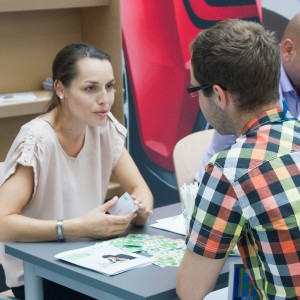 Professionalization is a byword in the lab. Getting started in the world of work can be daunting, until, of course, you understand that every new experience is practice for a future experience. The students who work on Digital Humanities projects (and succeed in DH courses) are the ones who know how to approach new tasks as practice for the higher-stakes experiences that follow graduation.
Professionalization is a byword in the lab. Getting started in the world of work can be daunting, until, of course, you understand that every new experience is practice for a future experience. The students who work on Digital Humanities projects (and succeed in DH courses) are the ones who know how to approach new tasks as practice for the higher-stakes experiences that follow graduation.
We’ve also discussed the informational interview in the lab, where the job seeker looks for information, rather than a job: find a few people with jobs you admire (company websites are a good place to start) and ask to meet with them–find out how they got their current positions, how they prepared while in university, what they did right after graduation, and what their company looks for in recent grads. You won’t get a job from these people, but you will know how to prepare yourself to be hired by similar companies, and you may even gain an ally or two who is invested in your success, and might, if you follow up courteously, volunteer to introduce you to potential employers and send job postings your way.
UBCO is one of the safest places to try new things–not just in the lab or classroom, but at events too–including a chance to try out your informational interview skills. Management is bringing employers to you at Career Days from November 2-6. If you are a student who is looking to build your skills in a low-pressure environment, before you have to call on them in a high-pressure environment outside of UBCO, I recommend signing up for Career Days’ Speed-Networking Social, to try out the informational interview technique. You will likely stand out as a student who isn’t pressing potential employers for a job, but who instead wants to know what path each employer took to get to his or her current position. Still, conducting an informational interview may be nerve wracking. It might leave your stomach in knots. But, think how much better you will be at the informational interview once you’ve had, well, just a little practice.
